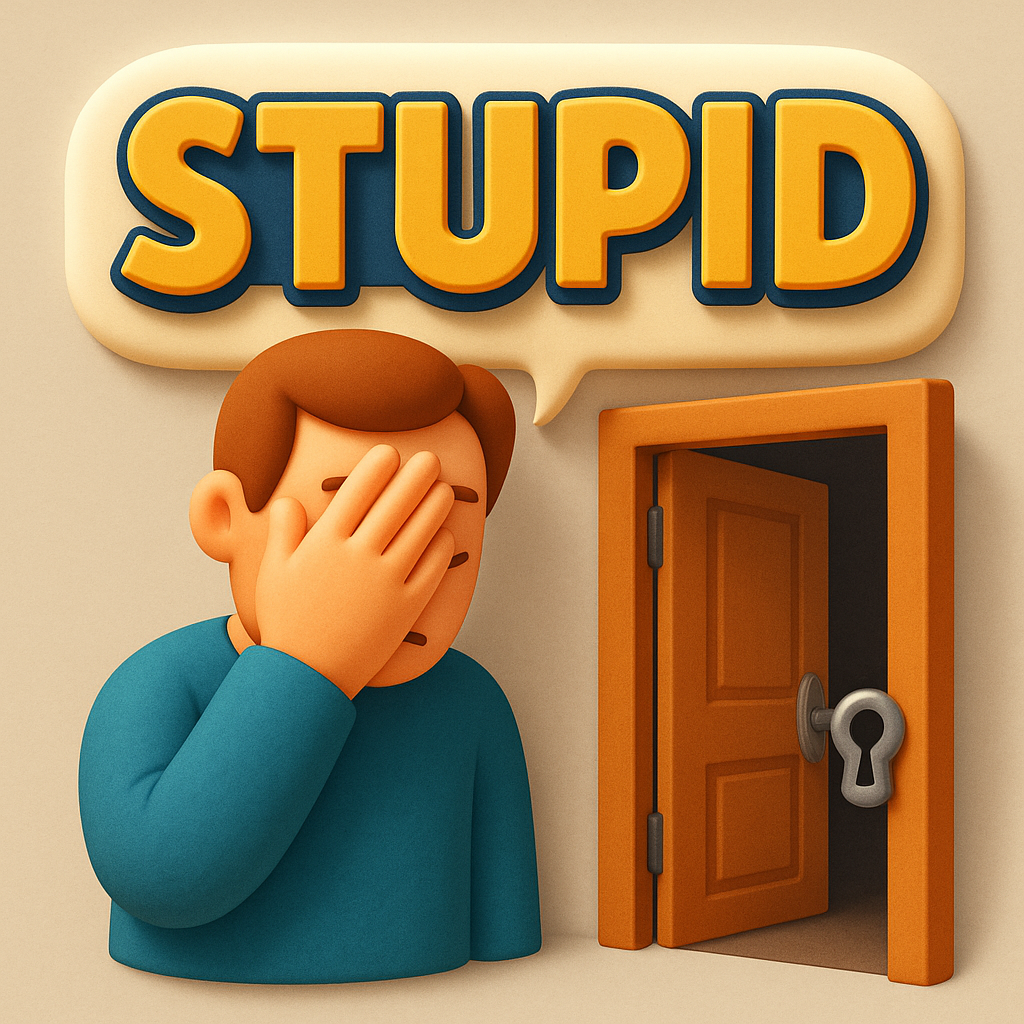Stupid
Definition
The term "stupid" describes someone or something lacking intelligence, common sense, or sound judgment.
Parts of Speech
- Adjective
- Noun
Pronunciation
American English
- IPA Pronunciation: /ˈstuːpɪd/, /ˈstjuːpɪd/
- Respelling: STOO-pid, STYOO-pid
British English
- IPA Pronunciation: /ˈstjuːpɪd/, /ˈstuːpɪd/
- Respelling: STYOO-pid, STOO-pid
Etymology
The word "stupid" originates from the Latin "stupidus," meaning "amazed" or "dazed," derived from "stupere," meaning "to be stunned or amazed." It entered Middle English through Old French "stupide."
Derivatives
- Stupidity (noun)
- Stupidly (adverb)
- Stupefy (verb)
- Stupidness (noun)
- Superstupid (adjective, informal)
Synonyms
- Foolish
- Unintelligent
- Ignorant
Antonyms
- Intelligent
- Smart
- Wise
Usage
The term "stupid" is often used in informal contexts to describe actions, decisions, or individuals lacking intelligence or logic. For example, "That was a stupid mistake" or "He felt stupid for forgetting his keys."
Related Terms
- Fool: A person who lacks sense or judgment.
- Ignorant: Lacking knowledge or awareness.
- Naive: Showing a lack of experience or sophistication.
Detailed Definitions
Adjective
- Lacking intelligence or sense: Describes a person or action devoid of logical thinking.
- Example: "It was a stupid decision to leave the door unlocked."
- Annoyingly or embarrassingly lacking reason: Refers to something that causes frustration or irritation due to its illogical nature.
- Example: "The stupid printer won't work."
Noun
- An unintelligent person: Refers to someone considered foolish or lacking judgment.
- Example: "Don’t be such a stupid!"
stupid



🇨🇳 Mandarin
- 愚蠢 (Yúchǔn) - Stupid (foolish)
- IPA Pronunciation: /y˧˥ ʈʂʰwən˨˩˦/
- English Respelling: Yoo-chwen
- 笨 (Bèn) - Stupid (not intelligent)
- IPA Pronunciation: /pən˨˩˦/
- English Respelling: Bun
🇮🇳 Hindi
- मूर्ख (Mūrkha) - Stupid (foolish)
- IPA Pronunciation: /muːɾkʰə/
- English Respelling: Moor-kha
- बेवकूफ (Bēvakūpha) - Stupid (not intelligent)
- IPA Pronunciation: /beːʋkʊːf/
- English Respelling: Bay-vk-oof
🇪🇸 Spanish
- Estúpido - Stupid (foolish)
- IPA Pronunciation: /esˈtu.pi.ðo/
- English Respelling: Es-tu-pee-dho
- Tonto - Stupid (not intelligent)
- IPA Pronunciation: /ˈton.to/
- English Respelling: Ton-to
🇫🇷 French
- Stupide - Stupid (foolish)
- IPA Pronunciation: /sty.pid/
- English Respelling: Stu-peed
- Idiot - Stupid (not intelligent)
- IPA Pronunciation: /i.djo/
- English Respelling: I-dyo
🇸🇦 Modern Standard Arabic
- غبي (Ghabi) - Stupid (foolish)
- IPA Pronunciation: /ɣæbiː/
- English Respelling: Gha-bee
- أحمق (Ahmaq) - Stupid (not intelligent)
- IPA Pronunciation: /ʔæħ.mæq/
- English Respelling: Ah-mak
🇧🇩 Bengali
- মূঢ় (Mūṛha) - Stupid (foolish)
- IPA Pronunciation: /muɖʱ/
- English Respelling: Moo-dh
- নির্বোধ (Nirbōdha) - Stupid (not intelligent)
- IPA Pronunciation: /nirbodʱ/
- English Respelling: Nir-bodh
🇷🇺 Russian
- Глупый (Glupyj) - Stupid (foolish)
- IPA Pronunciation: /ˈɡlupɨj/
- English Respelling: Glu-piy
- Тупой (Tupoy) - Stupid (not intelligent)
- IPA Pronunciation: /ˈtupəj/
- English Respelling: Tu-poy
🇵🇹 Portuguese
- Estúpido - Stupid (foolish)
- IPA Pronunciation: /ɨʃˈtupidu/
- English Respelling: Ish-tu-pi-du
- Idiota - Stupid (not intelligent)
- IPA Pronunciation: /i.ði.ˈɔ.tɐ/
- English Respelling: Idi-o-ta
🇮🇩 Indonesian
- Bodoh - Stupid (foolish)
- IPA Pronunciation: /bodoh/
- English Respelling: Bo-doh
- Idiot - Stupid (not intelligent)
- IPA Pronunciation: /idiot/
- English Respelling: Idi-ot
🇩🇪 German
- Dumm - Stupid (foolish)
- IPA Pronunciation: /dʊm/
- English Respelling: Dum
- Idiot - Stupid (not intelligent)
- IPA Pronunciation: /iˈdi̯oːt/
- English Respelling: I-di-yot
🇯🇵 Japanese
- 愚かな (Oroka na) - Stupid (foolish)
- IPA Pronunciation: /oɾoka na/
- English Respelling: O-ro-ka na
- バカ (Baka) - Stupid (not intelligent)
- IPA Pronunciation: /baka/
- English Respelling: Ba-ka
🇻🇳 Vietnamese
- Ngốc - Stupid (foolish)
- IPA Pronunciation: /ŋɔk˧˩/
- English Respelling: Ngok
- Đần - Stupid (not intelligent)
- IPA Pronunciation: /ɗan˧˥/
- English Respelling: Dan
🇰🇷 Korean
- 바보 (Babo) - Stupid (foolish)
- IPA Pronunciation: /pa.bo/
- English Respelling: Pa-bo
- 멍청이 (Meongcheongi) - Stupid (not intelligent)
- IPA Pronunciation: /mʌŋ.tɕʰʌ.ŋi/
- English Respelling: Meong-chong-i
🇹🇷 Turkish
- Aptal - Stupid (foolish)
- IPA Pronunciation: /ap'tal/
- English Respelling: Ap-tal
- Budala - Stupid (not intelligent)
- IPA Pronunciation: /bu'dala/
- English Respelling: Bu-dala
🇺🇷 Urdu
- بیوقوف (Bēvaqūf) - Stupid (foolish)
- IPA Pronunciation: /beːwəquːf/
- English Respelling: Be-wa-kuf
- احمق (Ahmaq) - Stupid (not intelligent)
- IPA Pronunciation: /əħmaq/
- English Respelling: Ah-maq





